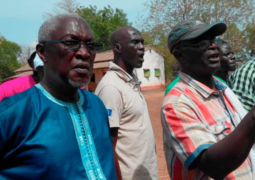The
National Council for Civic Education (NCCE) yesterday concluded nationwide
seminars on women participation in politics and elections at the CIAM
conference hall.
More
than 210 participants from all political parties in the country, majority of
whom are women, were sensitised in Basse, Janjangbureh, Farafenni, Mansa Konko,
Pakalinding, Bwian and the Greater Banjul Area.
The
theme for the seminars funded by Actionaid International The Gambia was:
“Enhancing women political participation and representation.”
In
his welcoming remarks, NCCE Chairman Alh Sering Fye said the seminars were
aimed at enhancing knowledge of participants on the importance of the
participation of women in politics and elections, as well as representation at
decision-making levels.
According
to him, the core problem the activity seeks to address is the limited
participation and under-representation of women in the country’s political
dispensation.
Mr
Fye pointed out that most women are actively participating in politics;
however, their “participation does not translate to their equal representation
in political offices as men”.
This
is because they are mostly active in organising, mobilising and campaigning for
men contesting for political offices instead of running for political office,
he reasoned.
NCCE
Chairman Fye remarked that for democracy and good governance to be attained,
there must be inclusive participation by the citizenry.
Bakary
Fadera, Actionaid International The Gambia programme specialist on education
and youth, said women’s political participation is also about women’s
leadership and engagement in decision-making processes.
He
quoted the Beijing Platform for Action, Fourth World Conference on Women 1995,
that “without the active participation of women and the incorporation of
women’s perspective at all levels of decision-making, the goals of equality,
development and peace cannot be achieved”.
He
said voting for women candidates in the forthcoming national assembly elections
is a fundamental principle of democracy.
Binta
Sidibeh, executive director of Women’s Bureau, for her part, said the major
women political participation challenge in The Gambia is the socialisation
process.
“Women
have also been trained with the belief that they are not leaders but should
instead be followers,” she observed.
In
order to tackle that challenge they need to address their social and cultural
barriers, she said.
Women
lack self-confidence in most cases to come forward and contest in elections,
she further said, adding that sometimes men are also favoured over women by
political parties in their selection of candidates.
She
said there are also the issues of women character assassination by fellow
women, and lack of financial and moral support, which has also been a challenge
for them.
Isatou
Jallow-Ndure, a commissioner at the Independent Electoral Commission, said it
is embarrassing and of concern in the country to realise that out of 48 seats
in the National Assembly only 3 women were elected and 1 nominated.
“When
you look at the political arena it is women that do the campaigning,” she said.



